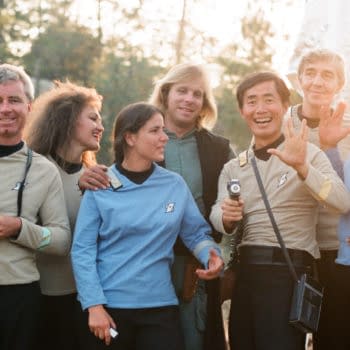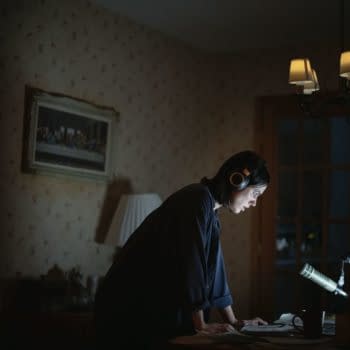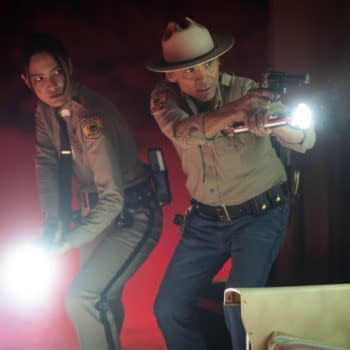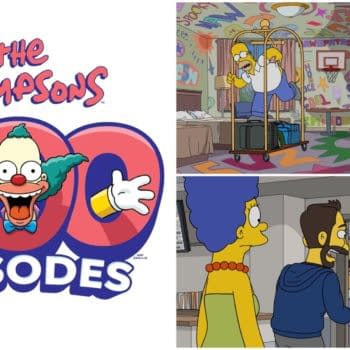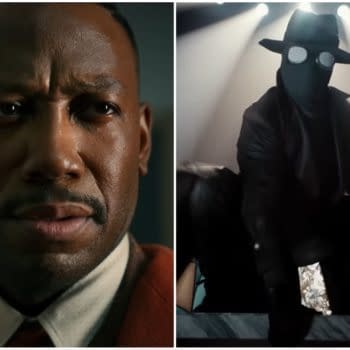Posted in: Look! It Moves! by Adi Tantimedh, Movies, Recent Updates, TV | Tagged: entertainment, film, ken levine, Must Kill TV, tv
When You Must Read "Must Kill TV" – Look! It Moves! By Adi Tantimedh
Adi Tantimedh writes:
Ken Levine, not the chap who develops the Bioshock videogames, but the Emmy-winning screenwriter who has written for shows like M*A*S*H, Cheers and Frasier, has forgotten more about screenwriting and comedy than most of us will ever know. He has a very funny blog where he talks about screenwriting and the industry, offering a very insider look at how things are done in Hollywood. Must Kill TV is his first novel after decades writing scripts. You should read it. It's on Amazon in print and as an ebook.
Must Kill TV is about a beleaguered TV network president Charlie Muncie, a nice, likable guy with his job on the line – his network only has one hit show after all the other new shows he greenlit tanked, and its star is threatening to quit after going through several seasons of boffo ratings. However, said star has asked Charlie for a favor: in return for which he would agree to stay for another season of his popular sitcom. He wants Charlie to have his ex-girlfriend killed. The bitch had the audacity to turn down his marriage proposal and therefore must die. Can a desperate network president afford to say no to his biggest star?
Hollywood is a state of mind. It's part of, but not always the same as, the Los Angeles state of mind though they're often intertwined. People who work in the Film and Television industry have a rather different way of looking at life since their work involves creating a fictional and often idealized, if not skewed, version of reality that's sold to millions if not billions, of people worldwide, and that many eyeballs are worth a lot of money. I've always been fond of Hollywood novels. They tend to be quite existential in nature, presenting a point of view that many people don't have and might find fascinating, even when it's appalling.
Charlie goes around telling himself he's a nice guy at heart, and many people say that to his face, enough for him to believe that even, as he not only slips but barrels at full-speed down several slippery slopes and does things that nice guys would never do. And all the while he tells himself that he's entirely justified in what he's doing. He's in therapy and he's a reasonable guy, so whatever he decides to do must be for perfectly reasonable motives. Like plotting to have someone murdered.
Comedy is also a state of mind. It's about taking the piss out of bad situations and laughing at people making bad decisions. What drives Must Kill TV is being inside Charlie Muncie's neurotic head as he tries to think and justify his way through his escalating set of problems without any real self-awareness at all. He is pretty much the walking definition of a schlemiel, the Yiddish term for a stupid, awkward, unlucky person. There's nothing more dangerous or funny than a stupid man who thinks he's being clever, and that provides endless fuel for comedy. Charlie is in complete denial that he might not be a good guy even as he does more and more bad things, thinking his marriage is fine when it's in freefall, from his anxiety over ratings and its effects on his job security, to thinking he might get away with cheating on his wife with an on-the-make massage therapist, and trying to work out how to find a hitman by reviewing how TV shows do it. This is a comedy about a man systematically ruining his life while wondering why his life is getting worse.
What makes the book funny is the way it uses Charlie's headspace to make fun of how a network suit thinks, how someone who doesn't have any real imagination or creativity tends to draw on terrible TV and movie ideas to look for solutions to their real life problems. The book is also a time capsule for what the TV industry looks like in the 2010s, full of insider satirical asides into what executives are thinking when they greenlight new shows. Charlie muses on headaches like the cop show that evolved into a gay cop couple show because its stars ended up in a relationship off-screen, which also resulted in the ratings dropping, the failed David Caruso sitcom, the failed Ann Coulter family comedy, all of which put a dent in his credibility as a president who could deliver hits.
He worries as much about keeping up his lifestyle of executive privilege and the entertainment industry's version of street cred should he get ousted by the stockholders if he fails to deliver a hit or keep the one hit show that's keeping his network afloat. The book is also a satire of how people in Hollywood generally think of themselves as well-intentioned even as they do awful things to each other. It even takes the piss out of people in the entertainment industry turning to religion to try to absolve themselves of the horrible things they do.
Novels about the movie industry are often serious and literary, even somber as they explore moral and existential dilemmas, though a small minority are comedies. On the other hand, I've found that the majority of novels about TV are comedies, and Must Kill TV is the funniest I've read for a while. It's not often that a book makes me laugh hysterically at every page, sometimes several times per page at that. It's not so much that Levine is writing a wisecracking protagonist so much as Charlie Muncie is completely unaware that his 90 mile-an-hour stream-of-consciousness musings are frequently ridiculous and thus hilarious. His self-examination is entirely on the shallow side, saturated with industry and business-speak to describe and exacerbate his insecurity and anxieties. The universe of Ken Levine's Los Angeles is just that little bit off-kilter and over-the-top, but not by much. He knows of what he writes, a world that's endlessly incestuous where everyone knows each other and wants to know what they're doing, running into each other at social functions all the time and putting on a polite face even as they might loathe and plot against each other.
This is a Los Angeles not that far away from the satirical, murderous hell depicted in Grand Theft Auto V where everyone is on the make and morally vacuous. If Must Kill TV is a snarky Dante's Inferno, then Charlie Muncie is its hapless Virgil. He's very far from innocent and he's desperately trying to convince himself things aren't that bad, not matter how much worse they keep getting. Levine makes him deceptively sympathetic in order to really turn the screws when the farcical plot twists into high gear. There's a steely mercilessness underneath the easy-going prose that's the sugar-coating to a hilariously bitter pill. Nothing turns out the way you think and certainly not the way Charlie Muncie wants.
Ken Levine shows that when a man descends into hell in the TV industry, it's film noir turned into high comedy.
Always after more time at lookitmoves@gmail.com
Follow the official LOOK! IT MOVES! twitter feed at http://twitter.com/lookitmoves for thoughts and snark on media and pop culture, stuff for future columns and stuff I may never spend a whole column writing about.
Look! It Moves! © Adisakdi Tantimedh












